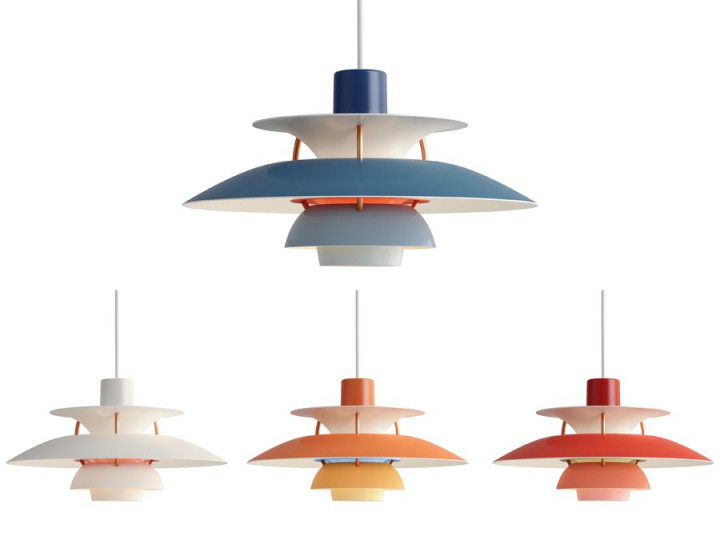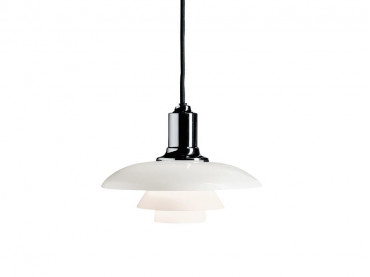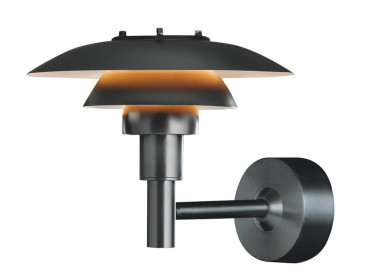Mid-Century modern scandinavian pendant lamp PH 5 mini by Poul Henningsen for Louis Poulsen
-
Poul Henningsen
-
Louis Poulsen
- LP042 Delivery time 1 / 2 weeks
Mid-Century modern scandinavian pendant lamp PH 5 mini by Poul Henningsen for Louis Poulsen *Required step
In order to help you to choose, and to receive samples, do not hesitate to contact us by email: contact@galerie-mobler.com or by phone: 01 43 33 20 12
Mid-Century modern scandinavian pendant lamp PH 5 mini by Poul Henningsen for Louis Poulsen. New product.
The PH 5 mini is a new realese in 30 cm diameter of the famous PH 5created in 1958 and still produced by same editor.
Poul Henningsen developed the PH 5 in 1958 in response to constant changes to the shape and size of incandescent bulbs by bulb manufacturers. The fixture was christened pH 5 due to the 50 cm diameter of the main shade. Poul Henningsen wanted to improve the colour reproduction characteristics of the light source in the PH 5. Small red and blue shades were therefore inserted to supplement the colour in the part of the spectrum where the eye is least sensitive – the red and blue areas – thereby subduing the light in the middle yellow-green region where the eye is most sensitive. To mark the 50th anniversary of the PH 5 In 2013 the PH 5 was introduced in 4 new matt colour combinations.
Light source : E14.
| Year | 1958 |
| Dimensions | H : 16,3 cm. Ø 30 cm. Cable length : 3 m. Weight : 1 kg |
| Material | Shades: Spun aluminium. Anti-glare disc: pale rose, green, dark grey or turquiose, spun aluminium. Struts: Aluminium bronze coloured. White textile cable. |
| Style | Classique Neuf |
| Origin | Denmark |
| Fournisseur | Louis Poulsen |
Poul Henningsen
Denmark (1894-1967)
Danish architect Poul Henningsen, known by his initials, PH was obsessed with light. He is the legendary creator of the lighting series carrying his name. He can be said to be the worlds first lighting architect.
Poul Henningsen devoted his entire career to investigating the importance of light for our well being. He worked on the theory that the observer should not be subjected to direct glare from the electric light source. Henningsen used a series of layered shades to both spread the light and conceal the light bulb, thus creating a softer more diffused lighting. One of Denmark's major figures in 20th-century lighting design, Henningsen was also an independent architect, designer of theatre interiors and tubular steel furniture, critic, and editor of the magazine Kritisk Revy (Critical Review). Highly critical of the widespread lack of imagination in domestic lighting in Copenhagen, Henningsen came to prominence with the first of his multi-shade lamps designed in 1924, setting the pattern for his subsequent lighting work. Known as the Paris Lamp (and later as the PH lamp) it won a competition for a light fitting for the Paris Exposition des Arts Décoratifs et Industriels of 1925, where he was awarded a Gold Medal, and was put into production by the Danish lighting manufacturer Louis Poulsen.
Henningsen's design principles were based on the scientific analysis of the ways in which lampshades distribute light, glare, and reflection. The PH lampshades were composed of a series of separate, interleaved elements that gently diffused the light throughout the space in which it was situated as well as directing it downwards








































